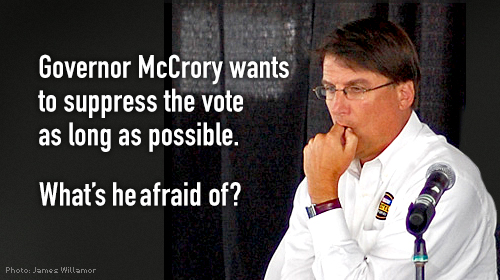
UPDATE (12/12/2013 4:45 pm): A federal judge today ruled that a trial over North Carolina's sweeping voter suppression law will be held in 2015. U.S. District Court Magistrate Judge Joi Peake also said the court would hear requests this summer for an injunction to halt some or all of the law's provisions from taking effect until after the trial. More details can be found here.
Today, the state of North Carolina will try to convince a judge to postpone a trial concerning the until after the 2014 midterm elections. The state's reason: so that it can carry out the elections under a regime that would burden thousands of eligible voters before the court has a chance to determine whether it violates federal law.
The ACLU and the Southern Coalition for Social Justice are challenging this law, which cuts early voting by a week, gets rid of same-day voter registration, and imposes a new voter ID requirement. Voters are also no longer allowed to cast provisional ballots for upper-ticket races like the U.S. Senate if they show up at the wrong polling place or get in the wrong precinct line to vote. Proponents of the law (including ) say that the changes are necessary to improve the integrity of elections. Aside from trying to address the rate of voter fraud in North Carolina, there's absolutely no evidence that cutting a week of early voting gets at election integrity.
Changes like these won't promote transparency; they'll only make it harder for people to vote. More than half of North Carolina voters used early voting in . If you want to know what happens when you cut early voting after voters have come to rely on it, look no further than Florida, which cut a week of early voting right before the 2012 election: the ; voters waiting several hours to vote and some casting ballots ; hundreds of thousands .
It's also important to note that these changes will have a bigger impact on minority voters. As outlined in our complaint on behalf of the League of Women Voters, the A. Philip Randolph Institute, Unifour OneStop Collaborative, Common Cause, and several private citizens, during the 2012 general election, 70 percent of Black voters in North Carolina cast their ballots during early voting, whereas only 52 percent of white voters used early voting. Given North Carolina's history, we find these early voting cutbacks, adopted after record levels of Black turnout in 2008 and 2012, particularly troubling.
We're in court today to try to ensure that this case is decided before the next election. If an unlawful election happens before the court has a chance to rule, we'll never get to do that election over. Election results will be final and disenfranchised voters will never get their votes back. If North Carolina officials really cared about election integrity, they would join us in asking the judge to decide whether these changes are unlawful before the next election.
Learn more about voter suppression and other civil liberty issues: Sign up for breaking news alerts, , and .



